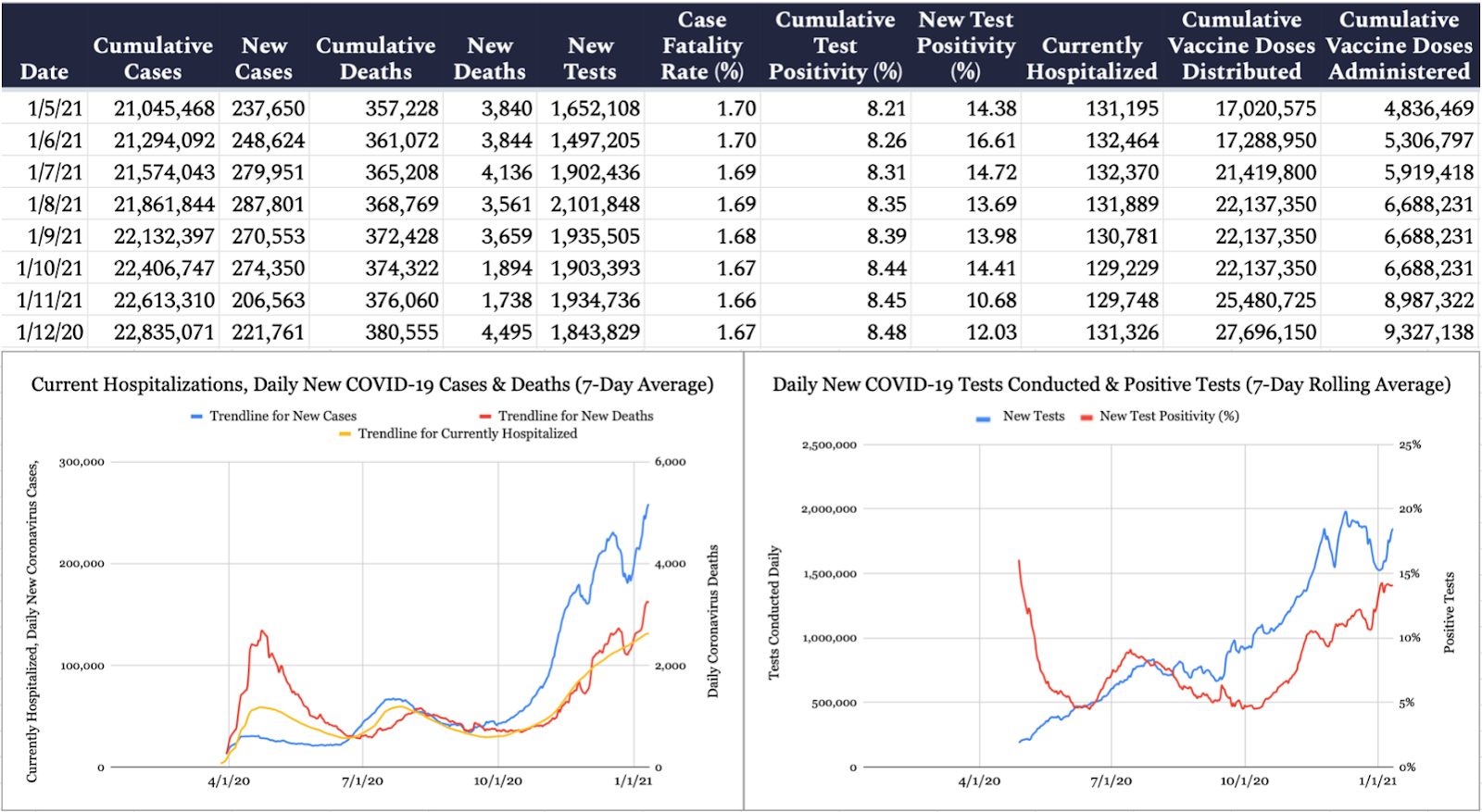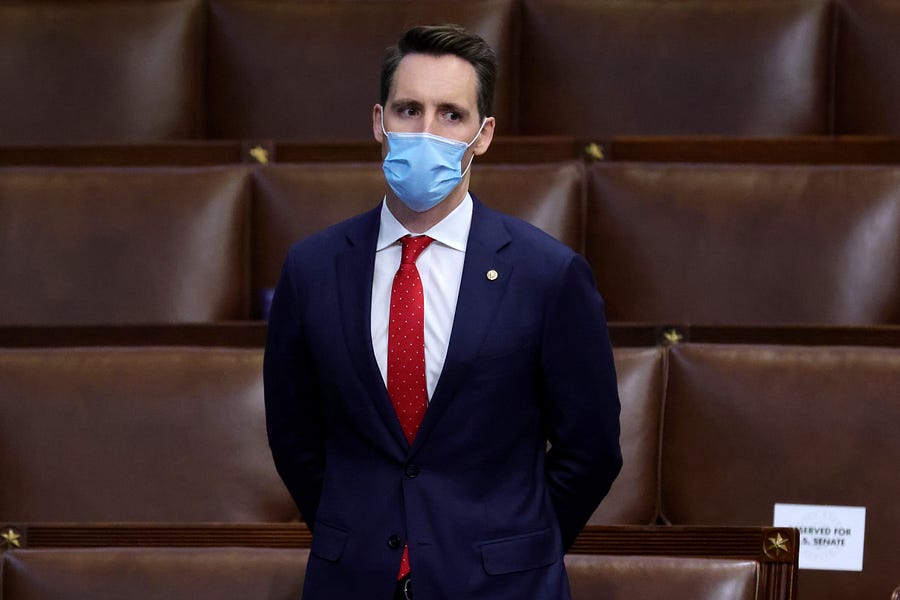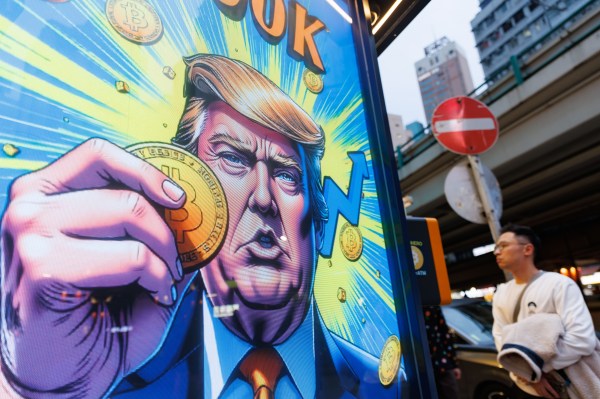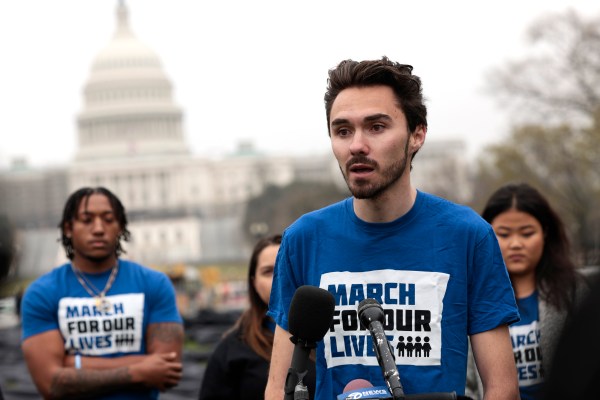Happy Wednesday! One quick programming note: Now that the Bears are out of the NFL playoff picture, TMD is putting Declan out to pasture and becoming a Chiefs/Packers newsletter.
Quick Hits: Today’s Top Stories
-
The FBI is reportedly preparing for armed protests at all 50 state capitals and in Washington, D.C. in the days leading up to President-elect Joe Biden’s inauguration. The Washington Post reports that a Virginia FBI office issued an explicit warning about violent extremism ahead of January 6, contradicting a senior agency official’s comments last week that the FBI “did not have intelligence suggesting the pro-Trump rally would be anything more than a lawful demonstration.”
-
The Trump administration unveiled a series of significant changes to its vaccine distribution plan on Tuesday in an effort to speed up the administration of inoculations, urging states to administer shots to anyone over the age of 65.
-
The House is expected to vote later today on whether to impeach President Trump for a second time. In a sign she expects the article of impeachment to pass, Speaker Nancy Pelosi has already named nine impeachment managers that will present the House’s case before the likely Senate trial.
-
Several Republicans—including Reps. Liz Cheney, John Katko, Adam Kinzinger, Jaime Herrera Beutler, and Fred Upton—announced yesterday they plan to vote to impeach President Trump, and 10 to 15 more GOP members are expected to join them.
-
Axios and the New York Times report that Senate Majority Leader Mitch McConnell is “pleased” that Democrats are moving to impeach President Trump, and that McConnell himself is leaning toward voting to convict the president.
-
The House voted along party lines last night to call on Vice President Mike Pence to invoke the 25th Amendment and remove President Trump from office, but Pence rebuffed the request in a statement that obliquely criticized the president and did not rule out impeachment.
-
In a rare public statement, the U.S. military’s Joint Chiefs of Staff condemned last Wednesday’s riots as a “direct assault” on the nation’s constitutional process, reiterating that, on January 20, “President-elect Biden will be inaugurated and will become our 46th Commander in Chief.”
-
President-elect Joe Biden is expected to nominate former financial regulator and Goldman Sachs executive Gary Gensler as chairman of the Securities and Exchange Commission.
-
YouTube announced last night it was suspending President Trump from uploading videos to his official YouTube page for at least seven days.
-
The federal government last night carried out its first federal execution of a female inmate since 1953.
-
At least three members of Congress—Pramila Jayapal, Brad Schneider, and Bonnie Watson Coleman—have tested positive for COVID-19 since the siege of the Capitol last week. The Democratic trio blamed their illness on a handful of their House Republican colleagues who refused to wear masks during the lockdown of the Capitol. The House voted last night to implement a fine system for those who don’t wear masks on the House floor: $500 deducted from a member’s pay upon the first violation, $2,500 upon the second.
-
Sheldon Adelson, the billionaire casino magnate who in recent years became one of the Republican Party’s largest donors, died on Monday at the age of 87.
-
The United States confirmed 221,761 new cases of COVID-19 yesterday per the Johns Hopkins University COVID-19 Dashboard, with 12 percent of the 1,843,829 tests reported coming back positive. An additional 4,495 deaths were attributed to the virus on Tuesday, bringing the pandemic’s American death toll to 380,555. According to the COVID Tracking Project, 131,326 Americans are currently hospitalized with COVID-19. According to the Centers for Disease Control, 27,696,150 COVID-19 vaccine doses have been distributed nationwide, and 9,327,138 have been administered.

Corporate Punishment
The House is preparing to vote later today on an article of impeachment against President Trump that cites his role in the assault on Capitol Hill last Wednesday. Some of Trump’s congressional allies are facing possible censure or (less possible) expulsion for their involvement in inflaming crowd sentiment prior to the attack.
Corporate America is getting in on the action too. In the days since violent insurrectionists—incited by GOP officials—attacked both the Capitol building and our democratic process, the private sector has come out swinging against the president and the Republicans that echoed his baseless claims of widespread voter fraud.
U.S. Chamber of Commerce CEO Thomas Donohue said Tuesday that Trump “undermined our institutions and ideals,” putting the onus on Vice President Mike Pence, the Cabinet, and Congress to address these grievances through established processes. “We trust them to use those tools judiciously, if needed, to ensure our nation’s well-being and security.” Neil Bradley, who oversees the Chamber’s formidable political spending, added that the group’s political action committee will no longer financially support politicians that do not “demonstrate respect for democracy.”
Some companies—including Google, Facebook, Microsoft, JPMorgan, and Citigroup—are using Wednesday’s violence as a rationale to phase out political giving entirely, at least for the moment. “Following last week’s awful violence in DC,” a Facebook spokesman said, “we are pausing all of our PAC contributions for at least the current quarter, while we review our policies.”
Other corporations are taking a more targeted approach. “In light of last week’s attack on the U.S. Capitol, Walmart’s political action committee is indefinitely suspending contributions to those members of Congress who voted against the lawful certification of state Electoral College votes,” the retail giant said in a statement. The Walt Disney Company came to the same conclusion, at least for 2021.
The drying up of financial support will hurt individual politicians—Kansas City-based Hallmark Cards specifically demanded Sens. Josh Hawley and Roger Marshall return the thousands of dollars the Hallmark Card political action committee gave them in recent years—but the moves will have a broader impact on the party.
“This is a leadership play,” Republican campaign strategist David Kochel told The Dispatch. “Leadership raises money from corporate PACs, and if they get the message from corporate PACs, they will listen. It’s a big damn deal.”
Minority Leader Kevin McCarthy has long been a prolific fundraiser for the GOP, and Sen. Rick Scott of Florida is set to head the National Republican Senatorial Committee for the 2022 cycle. Both voted to object to the electoral results in at least one state last week.
President Trump is also dealing with the private sector fallout from his involvement in Wednesday’s violence. The PGA of America on Sunday announced plans to move the 2022 PGA Championship from Trump National Golf Club Bedminster in New Jersey. “It has become clear that conducting the PGA Championship at Trump Bedminster would be detrimental to the PGA of America brand,” PGA of America President Jim Richerson said. “It would put at risk the PGA’s ability to deliver our many programs and sustain the longevity of our mission.”
The New York Times reports that Deutsche Bank—to whom Trump currently owes more than $300 million—plans to halt any future business with Trump or his company. Real estate company Cushman & Wakefield, which has handled office and retail leasing at many of the Trump Organization’s properties for years, told the Washington Post last night they were cutting ties with the president. New York-based Signature Bank announced Monday it was closing his personal accounts and returning the money in them.
Josh Hawley—the first senator to announce intentions to object to the January 6 electoral vote counting process—lost his book deal with Simon & Schuster over the move. “As a publisher it will always be our mission to amplify a variety of voices and viewpoints,” the New York-based company said. “At the same time we take seriously our larger public responsibility as citizens, and cannot support Senator Hawley after his role in what became a dangerous threat to our democracy and freedom.”
Hawley said that his losing of a book deal “could not be more Orwellian,” adding that all he was doing was “representing [his] constituents” and “leading a debate on the Senate floor on voter integrity.”
“It’s a direct assault on the First Amendment,” he concluded, threatening Simon & Schuster with a lawsuit. “Only approved speech can now be published. This is the Left looking to cancel everyone they don’t approve of.”
In reality, of course, Hawley’s complaints have little to do with the First Amendment, which in this scenario protects the right of Simon & Schuster—a private entity—to not amplify the speech of a government official. Hawley himself applauded this principle two-and-a-half years ago when the Supreme Court ruled in favor of Jack Phillips in Masterpiece Cakeshop v. Colorado Civil Rights Commission.
Remember the Coronavirus?
It’s a news dynamic we’re all familiar with by now. For most of 2020, COVID-19 was the biggest story any given week—unless something even more explosive came along to drive it from our minds for a few days. Then we’d come back around and realize once again that the virus didn’t take a break just because media coverage of it did, and hustle to get caught up on the latest depressing round of statistics about cases, hospitalizations, and deaths.
It’s playing out the same way today. As America’s attention has been riveted by the assault on the Capitol and the subsequent impeachment effort against President Trump, the coronavirus has quietly raced along, regularly smashing its own record for new infections. The death toll has continued to pile up: A staggering 4,495 Americans died from the virus on Tuesday alone.
As cases and hospitalizations continue to spike wildly upward, there’s one ray of hope to be seen: As scientists had expected, the new and more contagious COVID variant does not seem to be impervious to the vaccines that world governments have begun to roll out. Researchers at Pfizer who tested their vaccine against a lab-engineered version of the mutated virus late last week found that there was “no reduction in neutralization activity against the virus.” Although the test isn’t totally foolproof (the study only drilled down on one key mutation), the findings underscore again that the closing months of the pandemic are going to be a mad race to the finish, with the U.S. scrambling to spread immunity faster than the virus can spread itself.
To that end, the Trump administration is rolling out new guidelines for vaccine distribution in the hope of accelerating the process. Several major changes are coming: First, the government is advising states to relax eligibility requirements somewhat—the argument being that it’s better to make sure as many vulnerable Americans are getting vaccinated as quickly as possible than to waste time making sure population groups are vaccinated in the precise order states had intended.
“There was never a reason that states needed to complete vaccinating all health care providers before opening vaccinations to older Americans and other vulnerable populations,” Health and Human Services Secretary Alex Azar told reporters Tuesday. “States should not be waiting to complete 1a priorities before proceeding to broader categories of eligibility.”
A second change is more direct. Because both the Pfizer and Moderna vaccines require two doses a few weeks apart, the government had originally planned to hold some vaccine in reserve to ensure people who got the first shot wouldn’t be left hanging when it came time for their second. But Azar said that going forward the full supply will be made available, and that the government will rely on the ongoing manufacture of new vaccine to keep up with demand for patients’ second shots.
The latter change was something of a surprise, given the White House had previously clashed with the incoming Biden team on exactly this point. Last week, Biden’s transition team announced it planned to release the reserve of vaccine doses once Biden took office: “He supports releasing available doses immediately,” a transition spokesman said Friday, “and believes the government should stop holding back vaccine supply so we can get more shots in Americans’ arms now.”
A spokesman for Operation Warp Speed, Michael Pratt, fired back on Friday: “If President-elect Biden is calling for the distribution of vaccines knowing that there would not be a second dose available, that decision is without science or data and is contrary to the FDA’s approved label.”
The new guidelines will accelerate the pace of vaccinations, but there’s risk involved too: If companies fail to manufacture new doses on the required schedule, some early receivers of the vaccine may slip through the cracks and be unable to receive their second dose according to the appropriate timetable, effectively (though not entirely) wasting the first shot.
Worth Your Time
-
We’ve written exhaustively about what happened at the Capitol last week, both in TMD and on the website, but sometimes pictures are worth … well, you know the cliché. This visual timeline from a team of New York Times reporters does a great job piecing together Wednesday’s events and explaining how things got so out of hand so quickly.
-
Conservative writer and radio host Erick Erickson expanded upon some of the themes we touched on above in his newsletter yesterday. Cancel culture exists, and it is a threat, he writes. But that’s not what we’re seeing in the wake of last week’s insurrection. “No, I am not sympathetic to you over major corporations deciding not to give you a penny. No, I am not sympathetic to you getting your internet social media accounts canceled. No, I am not sympathetic to you having your rising career in politics ruined,” he writes of those facing repercussions for their role in Wednesday’s events. “This was bound to happen because you overplayed your hand and your action is causing a reaction. It is an equal and opposite reaction. Trying to cancel a presidential election causes a cancelation rebound.”
-
Do Mitt Romney and Marjorie Taylor Greene really belong in the same political party? Is it time for the GOP to split up? These questions will be asked a lot in the coming months and years—and Ross Douthat’s latest column serves as a good opening salvo. “Breaking points do come, and the violent endgame of the Trump presidency has exposed a new divide in the conservative coalition—not a normal ideological division or an argument about strategy or tactics, but a split between reality and fantasy that may be uniquely hard for either self-interest or statesmanship to bridge,” he writes. “It feels as if the Republican Party survived Trump’s presidency, but maybe not his disastrous and deadly leaving of it.”
Presented Without Comment
Also Presented Without Comment
Toeing the Company Line
-
David is angry in his latest French Press (🔒), arguing that—after last Wednesday’s violent riots—Donald Trump must lose big, and lose everywhere. “If we know anything about dealing with insurrectionary movements centered around charismatic leaders, it’s that they have to lose,” he writes. “The narrative surrounding the leader has to shift, dramatically, once and for all. The story of triumph has to become a cautionary tale.”
-
Sarah’s Tuesday Sweep newsletter wasn’t about campaigns, per se, but “inherent in any discussion of campaigns is self-government,” she writes. “What happened last week was an assault on the very idea of free and fair elections.” Check out the whole piece for answers to many of the legal questions you probably have right now: Can Congress bar the president from running for office again in 2024 with a simple majority under their impeachment power? Can the president pardon himself? What happens if the House passes articles of impeachment this week, but the Senate doesn’t conclude its trial until after the president has left office?
-
Princeton University political scientist Keith Whittington is Jonah’s latest Remnant guest, as he joins the podcast to talk all things impeachment. Is there any historical precedent for any of this? Does Trump’s conduct rise to the level of conviction? “There’s a difference between what a private citizen can say and what someone like the president of the United States should say,” Whittington says.
Let Us Know
There’s lots of gray area here, but where do you draw the line between “cancel culture” and “facing consequences for one’s actions?”
Reporting by Declan Garvey (@declanpgarvey), Andrew Egger (@EggerDC), Haley Byrd Wilt (@byrdinator), Audrey Fahlberg (@FahlOutBerg), Charlotte Lawson (@charlotteUVA), and Steve Hayes (@stephenfhayes).







Please note that we at The Dispatch hold ourselves, our work, and our commenters to a higher standard than other places on the internet. We welcome comments that foster genuine debate or discussion—including comments critical of us or our work—but responses that include ad hominem attacks on fellow Dispatch members or are intended to stoke fear and anger may be moderated.
With your membership, you only have the ability to comment on The Morning Dispatch articles. Consider upgrading to join the conversation everywhere.